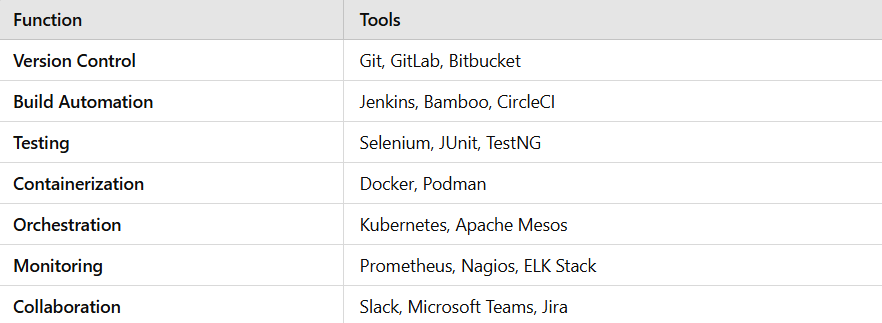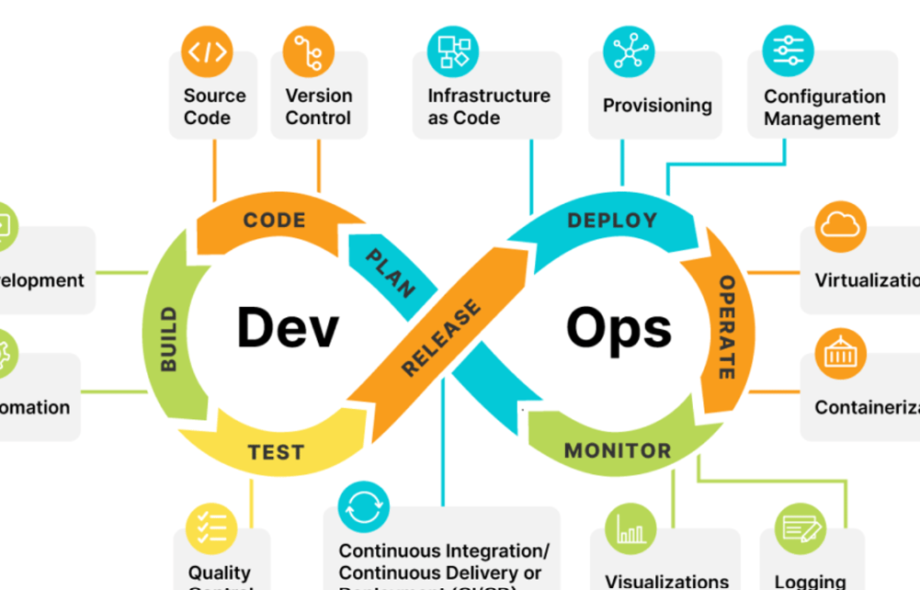The DevOps process flow integrates development and operations to streamline software delivery, improve collaboration, and ensure continuous integration and deployment. This methodology fosters a culture of automation, collaboration, and monitoring, enabling faster and more reliable delivery of software solutions. For organizations seeking scalability and efficiency, partnering with a DevOps services company can be a game-changer.
Below, we’ll break down the key components, stages, and benefits of the DevOps process flow, along with insights into choosing the right DevOps services provider.
What Is DevOps Process Flow?
The DevOps process flow is a set of practices that unites software development (Dev) and IT operations (Ops). Its core goal is to reduce the software development lifecycle and provide continuous delivery of high-quality applications. By automating processes and fostering collaboration, DevOps ensures agility and reliability in delivering software services.
Key Objectives of DevOps Process Flow:
- Faster software delivery through automation and CI/CD pipelines.
- Improved collaboration between teams to reduce silos.
- Enhanced product quality with real-time monitoring and testing.
- Streamlined infrastructure management via tools like Kubernetes, Docker, and Terraform.
- Organizations can achieve these objectives by leveraging DevOps services and solutions, which include advanced automation, robust cloud-native frameworks, and ongoing monitoring.
Stages in the DevOps Process Flow
The DevOps lifecycle consists of seven critical stages designed to create a seamless flow of development and deployment. Below is an overview of each stage:
1. Plan
Planning is the first stage where teams define the project scope, prioritize tasks, and set development timelines. Agile methodologies and collaboration tools like Jira or Trello are used to ensure transparency and align goals.
2. Develop
This phase involves writing, reviewing, and managing the codebase. Developers work in short, iterative cycles to enhance agility. Tools like Git, GitHub, or GitLab are commonly used for version control.
3. Build
The build stage compiles the source code into executable formats. Automated build tools like Jenkins and CircleCI streamline this process, reducing manual errors and ensuring faster execution.
4. Test
Automated testing is critical for identifying bugs before deployment. Tools such as Selenium, TestNG, and JUnit allow developers to perform unit, integration, and performance testing at scale. Continuous testing ensures code quality and prevents regressions.
5. Release
In this stage, applications are prepared for deployment. By utilizing containerization tools like Docker and orchestration platforms like Kubernetes, teams can package and deploy software efficiently.
6. Deploy
The deployment phase involves releasing applications to production environments. Continuous Deployment (CD) pipelines enable seamless, automated deployments without downtime. Popular tools for deployment include AWS CodeDeploy and Ansible.
7. Operate and Monitor
Post-deployment, DevOps focuses on monitoring application performance and infrastructure health. Real-time monitoring tools like Prometheus, Grafana, and ELK Stack provide actionable insights to optimize operations.
Key Tools in DevOps Process Flow
Using the right tools is crucial for achieving DevOps efficiency. A DevOps services provider typically integrates best-in-class tools to enhance automation, collaboration, and monitoring. Below are essential tools categorized by function:

By leveraging these tools, DevOps services companies can optimize workflows and deliver seamless development pipelines.
Benefits of DevOps Process Flow
Adopting a DevOps process flow offers several advantages for businesses aiming to scale and innovate faster. Key benefits include:
1. Faster Time-to-Market
Automation across the CI/CD pipeline reduces development and deployment cycles, enabling quicker delivery of features and updates.
2. Enhanced Collaboration
DevOps fosters a culture of shared responsibility between development and operations teams. This eliminates silos and improves team productivity.
3. Improved Quality
Automated testing and continuous monitoring identify bugs and performance bottlenecks early, resulting in more robust and reliable software.
4. Cost Efficiency
Automating repetitive tasks and optimizing resource utilization lowers operational costs. Tools like Kubernetes and Terraform also allow businesses to scale infrastructure efficiently.
5. Scalability
DevOps enables seamless scaling of applications and infrastructure, making it ideal for cloud-native environments and businesses with dynamic workloads.
By leveraging DevOps services and solutions, organizations can unlock these benefits and accelerate their digital transformation journey.
Why Partner with a DevOps Services Provider?
Implementing DevOps in-house can be challenging without the right expertise and resources. Collaborating with a DevOps services company provides access to experienced professionals, cutting-edge tools, and tailored solutions.
Key Advantages of Hiring a DevOps Services Provider:
- Expertise in Tool Integration: DevOps providers integrate industry-leading tools into your workflows for optimized automation.
- Custom Solutions: They tailor DevOps strategies to fit your unique business needs.
- Ongoing Support: Providers offer 24/7 monitoring and troubleshooting to ensure uptime and performance.
- Scalability: They help scale infrastructure dynamically, ensuring smooth operation during peak loads.
- Faster ROI: Professional services reduce implementation timelines, delivering faster returns on investment.
When selecting a DevOps services provider, prioritize companies with a proven track record in delivering scalable and secure DevOps solutions.
Choosing the Right DevOps Services Company
The success of your DevOps strategy largely depends on selecting the right partner. Here are key factors to consider:
Experience and Expertise: Evaluate the provider’s experience with cloud-native technologies, CI/CD pipelines, and container orchestration.
Customization: Ensure the company offers tailored DevOps services and solutions to address your business goals.
Tool Proficiency: Check their expertise in popular tools like Docker, Kubernetes, Jenkins, and Prometheus.
Portfolio and Client Testimonials: Review case studies and client feedback to gauge the provider’s reliability and performance.
Scalability: Confirm that the provider can scale solutions as your business grows.
Conclusion
The DevOps process flow is a transformative approach that streamlines software delivery, enhances collaboration, and ensures continuous improvement. By automating key processes and leveraging advanced tools, DevOps eliminates inefficiencies and fosters agility in modern software development.
Partnering with a reputable DevOps services company can provide businesses with the expertise and solutions they need to implement successful DevOps strategies. Whether you’re looking for comprehensive DevOps services and solutions or ongoing support, selecting the right provider is critical for long-term success.
If you’re ready to transform your development workflows, consult a DevOps services provider to get started today.
FAQs
1. What is the primary goal of DevOps?
The primary goal of DevOps is to accelerate software delivery through automation, collaboration, and continuous integration while maintaining high quality and reliability.
2. What industries benefit most from DevOps?
DevOps benefits industries like SaaS, e-commerce, fintech, healthcare, and any organization reliant on frequent software updates or scalable infrastructure.
3. How do DevOps services companies ensure security?
They integrate security into the CI/CD pipeline (DevSecOps) using tools like SonarQube, Snyk, and automated vulnerability scanning to detect and fix issues early.












